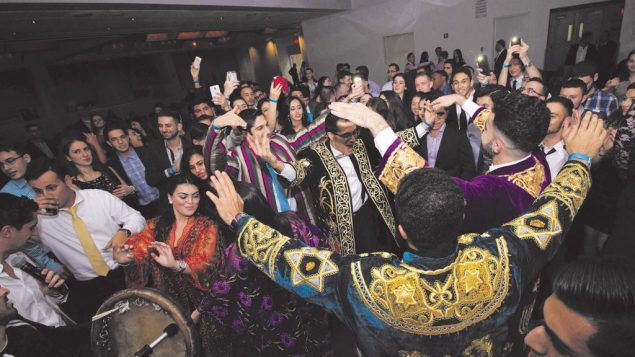
Queens College’s Hillel director helps keep an ancient civilization alive.
When I was a college student at the University of Pennsylvania in the late 1990s, Hillel helped me find a Jewish community on campus and provided me with a forum to develop leadership skills and opportunities to find out who I am and what makes me special.
So when I became the executive director of New York’s Queens College Hillel in 2011, my instinct was to replicate my enriching experience for the benefit of the 4,000 Jewish students I’d be serving.
Little did I know that I’d also be spending my days helping to save an ancient Jewish civilization.
In my case, everything began in 2012 on a Hillel coffee date, the kinds of get-togethers Hillel is known for. I had gathered some of Queens College’s 1,000 Bukharian students together and asked them what keeps them up at night. They told me, “We are afraid that we will be the last generation of Bukharian Jews.”
Need some background? The Bukharians make up a 2,500-year-old Jewish civilization that settled in Central Asia after the Babylonian exile of 586 B.C.E., and started emigrating from Uzbekistan to Forest Hills, Queens, in the 1990s. The world’s Bukharian community (outside of Israel) is now centered about a 10-minute drive from our campus.
The elders tell me they are worried that their children will “melt away” into the American melting pot. The young are unwilling to forego the opportunities that America provides, and yet feel that they have nothing of their own to pass on to the next generation.
Not on my watch, I said to myself.
My next step was to listen and to learn. My staff and I began seeking out partners — both individuals and local organizations — who could teach us more about the challenges facing the Bukharian-Jewish community.
On one of those first coffees with students, we met Yasmin Pinhasov-Malaev, a student leader who wanted to create a space on campus for her community. She took the reins and with our help founded the Bukharian Cultural Club, of which she served as president for two years. Yasmin says that her time working with Hillel was the best time of her life because she was able to learn about her own culture and become the passionate advocate for it she is today.
During Pinhasov-Malaev’s tenure, we hired a part-time Bukharian professional to work with Bukharian students. As much as I had become enamored with the culture and enthusiastically joined the students in their passionate drive to keep it alive, I knew that I couldn’t really assume the role of an authentic partner — after all I didn’t speak either Bukharian or Russian, and I do not share their individual or collective Sephardic heritage or experience. Despite my good intentions, I’m still an “Ashky.”
After a long search we found Ruben Shimonov, a teacher and scholar who came to work at Queens College Hillel a few hours a week at first, before assuming a full-time role.
The first signature program that Ruben and Yasmin created together was Choikhona — Tea House. This is a traditional Bukharian community event that we revived where students study, discuss and celebrate various aspects of Bukharian life: culture, history, language. We’ve had Bukharian games, dancers and musicians in the Shoshmaquom style — traditional Bukharian dress and instruments. We also created leadership training opportunities for Bukharian and other Sephardic/Mizrahi students that have created a new pipeline for students to gain leadership skills they will need to take over the mantle of leadership of their communities in just a few years.
In 2016, we helped to foster the Bukharian Jewish Union (BJU), a new platform for Bukharian Jews in their 20s and 30s to find their own voice. Educational programs like “Unconventional Bukharian Careers” are designed to help ease the transition from “college student” to “young professional.”
Now, Manashe Khaimov is working with us. An accomplished community organizer, Khaimov was an early partner of ours when he worked at the JCCA Bukharian Teen Lounge in New York and is also a founder of BJU. He has been instrumental in our most recent project. This year, we launched MEROS (“heritage” in Bukharian), a new Center for Bukharian Jewish Research and Identity, highlighting our role as the leading authority in engaging Bukharian college-aged youth.
Over the next year we’re hoping to dedicate a wing of our Hillel space to Bukharian history and tradition, complete with books, art and historical items to help engage the next generation with power and authenticity.
When I took this job, I knew that working on an individual level with students would be satisfying. I honestly never could have imagined that I would have a hand in strengthening and protecting the future of an ancient, vibrant Jewish “tribe” as it takes its place among its fellow 21st-century American Jews.
Meet you at the Choikhona.
credit to jewishweek.timesofisrael.com









